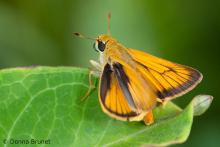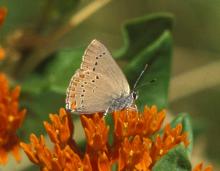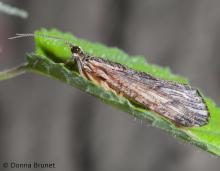Butterflies and Moths
Media

Species Types
Scientific Name
Anatrytone logan
Description
The undersides of the Delaware skipper's wings are solid orange. It's found statewide in a variety of habitats.
Media

Species Types
Scientific Name
Satyrium titus (syn. Harkenclenus titus)
Description
The coral hairstreak is the only Missouri hairstreak lacking hindwing “tails” and without a blue spot on the outer hindwing edge.
Media

Species Types
Scientific Name
Libytheana carinent
Description
Most of us identify butterflies by their color patterns, but you can ID the American snout by its long “nose.”
Media

Species Types
Scientific Name
Junonia coenia
Description
The common buckeye is one of Missouri’s prettiest butterflies, but it doesn’t overwinter here. Instead, migrants arrive in late spring and early summer.
Media

Species Types
Scientific Name
More than 12,000 species in North America north of Mexico
Description
Learn about moths as a group. What makes a moth a moth? How are moths different from butterflies? What are the major groups of moths?
See Also


Media

Species Types
Scientific Name
About 1,500 species in North America north of Mexico
Description
Adult caddisflies are mothlike. Their larvae are aquatic and build portable, protective cases out of local materials, including grains of sand, bits of leaves and twigs, and other debris.
Media

Species Types
Scientific Name
Corydalus cornutus
Description
Adult eastern dobsonflies are huge and mothlike, with large wings and a weak, fluttery flight. The fiercely predaceous aquatic larvae, called hellgrammites, are well-known to anglers, who often use them as bait.
About Butterflies and Moths in Missouri
Butterflies, skippers, and moths belong to an insect order called the Lepidoptera — the "scale-winged" insects. These living jewels have tiny, overlapping scales that cover their wings like shingles. The scales, whether muted or colorful, seem dusty if they rub off on your fingers. Many butterflies and moths are associated with particular types of food plants, which their caterpillars must eat in order to survive.





















